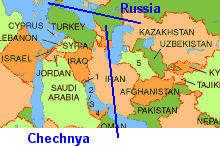

Kazakhstan or Kazakhstan , officially Republic of Kazakhstan, republic (1995 est. pop. 17,377,000), c.1,050,000 sq mi (2,719,500 sq km), central Asia. It borders on Siberian Russia in the north, China in the east, Kyrgyzstan, Uzbekistan, and Turkmenistan in the south, and the Caspian Sea and European Russia in the west. Astana is the capital and Almaty (Alma-Ata) is the largest city. Other major cities include Shymkent, Semey, Aqtöbe, and Öskemen
The Kazakh Hills in the core of the region have important mineral resources. Coal is mined at Qaraghandy and Ekibastuz, and there are major oil fields in the Emba basin (which includes the important Tengiz fields), in the Mangyshlak Peninsula, and at Karachaganak (near the Russian border NE of Aksai). Kashagan, a field S of Atyrau in the NE Caspian Sea, appears to have great potential. A pipeline was built in the 1990s to connect the nation's oil fields to the Black Sea. Kazakhstan also has large deposits of natural gas, iron ore, manganese, chrome, lead, zinc, silver, copper, nickel, titanium, bauxite, and gold. The Irtysh River hydroelectric stations are a major source of power.
Chechnya or Chechen Republic [chuchen'] , region (1990 est. pop. 1,300,000,
with neighboring Ingushetia), c.6,100 sq mi (15,800 sq km), SE European Russia,
in the N Caucasus. Grozny is the capital. Prior to 1992 Chechnya and Ingushetia
comprised the Checheno-Ingush Republic.
The mountainous region has important oil deposits, as well as natural gas,
limestone, gypsum, sulfur, and other minerals. Its mineral waters have made it a
spa center. Agriculture is concentrated in the Terek and Sunzha river valleys.
Oil, petrochemicals, oil-field equipment, foods, wines, and fruit are produced.
The population, which is concentrated in the foothills, is predominantly
Chechen. The Chechen, like the neighboring Ingush, are Sunni Muslim, and speak a
Caucasian language.
History
Recognized as a distinct people since the 17th cent., the Chechens were the most
active opponents of Russia's conquest (1818–1917) of the Caucasus.
They fought bitterly during an unsuccessful 1850s rebellion led by Imam Shamyl. The
Bolsheviks seized the region in 1918 but were dislodged in 1919 by
counterrevolutionary forces under Gen. A. I. Denikin.
After Soviet rule was reestablished, the area was included in 1921 in the
Mountain People's Republic. The Chechen Autonomous Region was created in 1922,
and in 1934 it became part of the Chechen-Ingush Region, made a republic in
1936. After Chechen and Ingush units collaborated with the invading Germans
during World War II, many residents were deported (1944) to Central Asia.
Deportees were repatriated in 1956, and the republic was reestablished in 1957.
In 1991, as the Soviet Union disintegrated, the Chechen-dominated parliament of
the republic declared independence as the Republic of Ichkeria, soon better
known as Chechnya. In June, 1992, Russia granted Ingush inhabitants their own
republic (Ingushetia) in the western fifth of the territory.
Tensions between the Russian government and that of Chechen president Dzhokhar
Dudayev escalated into warfare in late 1994, as Russian troops arrived to crush
the separatist movement. Grozny was devastated in the fighting, and tens of
thousands died. Russian forces regained control of many areas in 1995, but
separatist guerrillas controlled much of the mountainous south and committed
spectacular terrorist actions in other parts of Russia. Fighting continued
through 1996, when Dudayev was killed and succeeded by Zelimkhan Yandarbiyev.
The Russians withdrew, essentially admitting defeat, following a cease-fire that
left Chechnya with de facto autonomy.
Aslan Maskhadov, chief of staff of the Chechen forces, was elected president
early in 1997 but appeared to have little control over the republic. In 1999,
Islamic law was established. Terrorism, including a series of bombings in
Moscow, erupted again, and after Islamic militants invaded neighboring Dagestan
from Chechnya, Russian forces bombed and invaded Chechnya, capturing Grozny and
forcing the rebels into mountain strongholds. The rebels have continued to mount
guerrilla attacks on Russian forces, as well as terror attacks in Moscow and
other Russian cities outside Chechnya. Both sides have been accused of brutality
and terrorizing noncombatants. In Mar., 2003, voters approved a new constitution
for Chechnya, and in October Akhmad Kadyrov was elected president, but the
election was generally regarded as neither free nor fair. Both the constitution
and the president were backed by Russian government. Kadyrov was assassinated in
May, 2004. Prime Minister Sergei Abramov became interim president, and an
election was scheduled for August.
Black Sea, inland sea, c.159,600 sq mi (413,360 sq km), between SE Europe and Asia, connected with the Mediterranean Sea by the Bosporus, the Sea of Marmara, and the Dardanelles. It is c.750 mi (1,210 km) from east to west, up to 350 mi (560 km) wide, and has a maximum depth of 7,364 ft (2,245 m). Its largest arm is the Sea of Azov, which joins it through the Kerch Strait. The Black Sea is enclosed by Ukraine on the north, Russia on the northeast, Georgia on the east, Turkey on the south, - Georgia and Turkey are friendsly with the USA - and Bulgaria and Romania on the west.
We have to first find out who is sponsoring the Kazakhstan - Black Sea Oil pipe line, and the relationships of all the countries in its path with US, the main investor. Russia is in the way because of Chechnya. It is only after the fall of the Soviet Union, did the disputes start, and it is any body's guess in the geo-political struggles, as to who will benefit more if Chechnya would become independent, and Russia would be exposed on its southern flank. Note that Caspian sea is to the south of Chechnya, through which volunteers come from Afganishan, and other countires. Watch the geographic position of all these countires. Moscow is not too far from this region. If you would like to make more research, visit: http://www.infoplease.com/ce6/world/A0811595.html
You can get Atlas, Encyclopedia, Almanac. The site is a US research site
Thus it portrayed as "human rights" problem by the West, but the real intentions are at the moment still invisible to them.